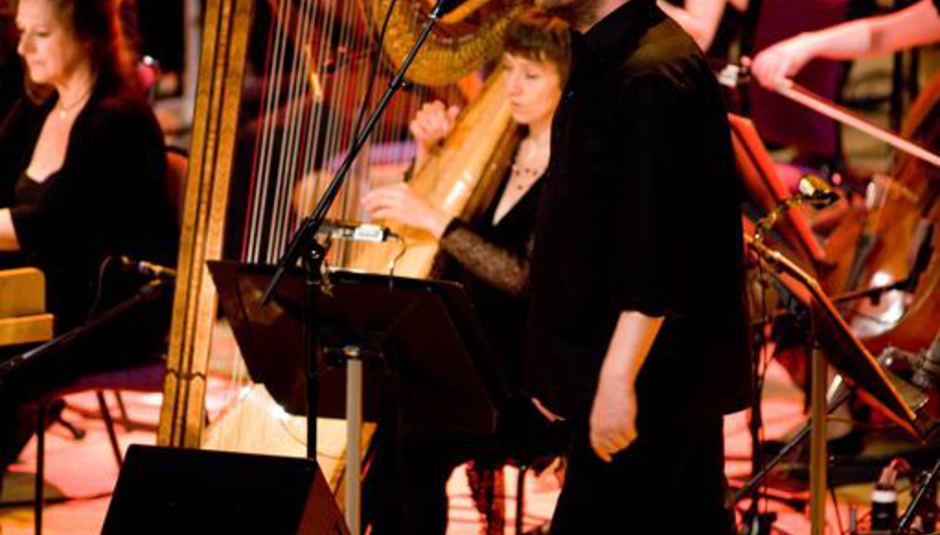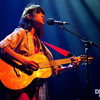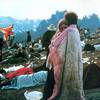The biennial Manchester International Festival is one of the sceptered isle's more outstanding cultural happenings, and like the team of non-parochial cultural types we are, DiS has spent the last few weeks infiltrating the cream of the festival's musical events. Here is a review. A really long review. A really, really long review.
Kraftwerk, Manchester Velodrome, July 2
First things first: ambient light seepage did wreak some low-level havoc with the in-theory dream combination of Kraftwerk, 3D projections, the Velodrome and (in particular) support act Steve Reich. Nonetheless, when sundown finally came about two thirds of the way through the krautbleep behemoths set, those of us who’d located a pair of 3D glasses were able to squeal in irony-free delight as some giant pixellated pills floated slowly towards our puppyishly overexcited faces. And it was weirdly thrilling, despite these 3D segments looking as though they’d been knocked together on a Commodore 64 by someone who still thinks of (naff Eighties kid-slaying TV show) Knightmare as the zenith of virtual reality achievement.
Oh, the music? Well, y’know...pretty flawless, as you’d expect. And a hugely generous set, all things considered: 'The Man-Machine', 'Autobahn', 'Computer Love', 'The Model', a tub-thumpingly politicised 'Radioactivity' and of course 'Tour De France', during which the - erm - Great British cycling team trundle out and do a few laps to a sort of Mexican wave of warmly appreciative WTF?-age. It’s a hatstand moment, but a memorable one, and it actually does a nice job of uniting the two halves of the crowd, making a feature of the area separating the seated butty-munchers and us hardcore überdoods in the standing pit.
Sweat-soaked, over-lit and under-crowded, it wasn’t a gig without its problems. However, the solid volume hike for Ralf Hütter’s men after the whispery Steve Reich opening, coupled with the fact that Kraftwerk’s mesmeric electro-loops could easily hold our attention through unfolding Armageddon, made for a pretty triumphant opening to Manchester International Festival 2009. A palpable wave of smugness followed those cyclist around the arena: regardless of whether it was actually the greatest show ever or not, we knew we’d all be able to annoy loads of people later by saying "I was there". (Mark Powell)
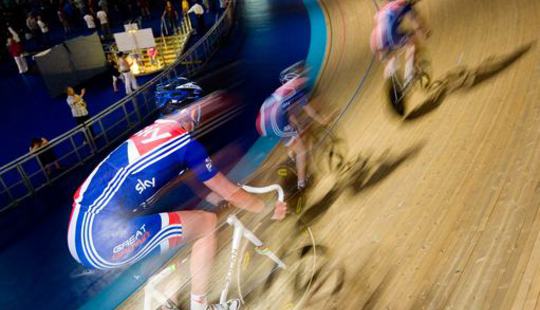
Anthony And The Johnsons, Manchester Opera House, July 3
Antony tells us that he has recently been dreaming of mountains; vast ranges, tough as diamonds. He wonders aloud why his muses have shifted from intangible, ineffable things to those that are giant, immutable. Tonight, he explains, he wanted to explore what it would feel like to be inside a mountain or crystal – and glances up at a geometric pendant of white fabric that hangs from the ceiling like a chunk of quartz or core of ice. This kite structure, by artist Carl Robertshaw, forms the centrepiece of a scenography created especially for these two shows, a set design that reflects Antony's preoccupations with our earth – its elements, its vulnerability, its inexplicable terrain.
But first; from the beginning, and 'For Today I Am A Boy'. Standing behind a painted silkscreen and robed in linen and netting, Antony barely materialises. While his body seems to vanish, reappear and shift perspective, his voice – that quivering hum, that owlish tongue – is certain as stalactite, lyrical and indelible. Above him swim schools of green fins, their shapes being drawn and redrawn by lighting designer Paul Normandale's laser show. Antony spends a great deal of time watching these various spirited movements; during his desolate cover of Beyoncé's 'Crazy In Love', a pendulum of lime light swings from right to left, its beam splintering into emerald arrows as it sears the floor. For 'Another World', hundreds of hot, red embers fleck the darkness. He gazes at the crimson rain.
Having been obscured by a series of veils for most of tonight's performance, the players of Manchester Camerata are finally revealed during the foreboding coda of 'Her Eyes Are Beneath The Ground' – and sweep into a querulous, set-stealing 'Cripple And The Starfish'. Prismatic colours scatter into hundreds and thousands against Robertshaw's diamond. “I am very happy; so please hit me,” Antony chokes. “I am very, very happy; so please hurt me.”
We leave feeling... I don't know. As though we must do something. As though we have a responsibility. (Lauren Strain)
Elbow and The Hallé – Bridgewater Hall, 8 July
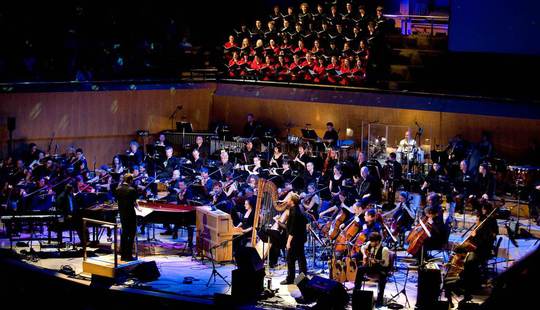
Elbow’s paradoxically heart-wrenching and heart-warming tunes regularly draw on additional instrumentation for their soul-bleeding effects. It was only a matter of time, then, that some clever clogs – in this case, the Manchester International Festival – would get the builders in for some serious orchestral expansion. The chosen craftsman was Salford composer Joe Duddell, who was charged with curating the melodic explosions witnessed at Bridgewater Hall as the Bury quintet were joined by fellow northern titans the Hallé Orchestra and Youth Choir, who carefully nurtured fledgling numbers into thickly textured walls of warmth; mature, lavish, experienced music that earned its exponents a standing ovation before the first half was out.
Guy Garvey’s emotive and occasionally falsetto timbres mixed with the innocent and unbroken tones from the younger singers to reveal tales of love, loss and friendship. Energetic brass punctuated its way through 'Grace Under Pressure' with alarming vigorousness. Additional strings on tracks from The Seldom Seen Kid added a decadent, spine-tingling lushness; the songs evolving into epic multidimensional layers of sound. Enquiring "are we having the time of our lives?" in 'Weather To Fly', Garvey seemed to summarise the feeling among fans who clutched at each other, a sea of hands waved in support.
(Claire Jackson)
Prima Donna, Palace Theatre, July 10
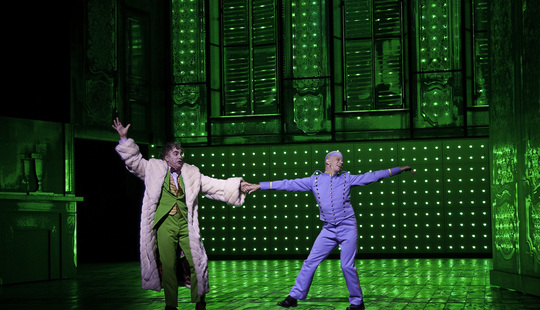
Opera has always been traceable in Rufus Wainwright's music. Just listen to Want Two's slightly incongruous opener 'Agnes Dei', or 'Greek Song' from Poses, which borrows the melody from Weber's 'Freischütz.' So it's not really a surprise that Wainwright has turned his hand to the artform. In many ways, tonight's premiere of Prima Donna is a coming of age for the Canadian troubadour, the completion of his youth as he re-embraces the classical education he once rebelled against. Sung entirely in French (with English surtitles) and set in Paris, Prima Donna tells the story of faded singer Régine Saint Laurent, who is given one more night to cast away the demons of her past and redeem her status as one of the world's leading operatic sopranos.
It's a pleasant, if slightly insubstantial, premise for two and half hours worth of opera, and ultimately, pleasant is how the show plays out. Which is a relief, but the unpleasant news for Wainwright is that he seems to have been caught between his own innate ability to entertain the masses and a desire to stick to operatic convention.
The sets are beautifully lavish, rich in colour and change almost constantly, while the show's side performers bring a sense of playfulness to what is, in essence, a fairly ceaseless libretto melodrama. So too does Wainwright's charmingly daft humour, which marbles the show throughout.
But then there's the flipside. Yes, the two main protagonists are memorably characterised. Janis Kelly is majestic as the traumatised diva, Régine. Jonathan Summers is truly convincing as Régine's relentless, single-minded butler. But despite these memorable performances, there are elements that are too easily forgotten. Musically, Prima Donna seems to lack the sense of adventure of Wainwright's pop music playing it far, far too safe. Perhaps if Wainwright were a little less reverent, he would have had the chutzpah to create something that, musically, leant more on his own obvious love for satisfying melody than on his idea of what opera should be and how it should be composed.
The show's climax is also forgettable. Régine's operatic career doesn't shine again. She merely accepts her fate and embraces Paris. Oh. “It went nowhere!” said an audience member as he made his way home. In truth, Prima Donna just didn't go far enough. (Gideon Brody)
It Felt Like A Kiss, Quay House, July 15
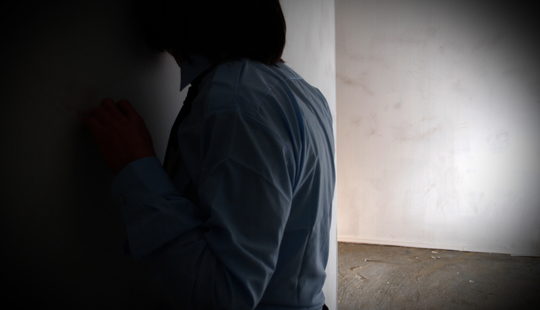
A collaboration between promenade theatre specialists Punchdrunk, doomily brilliant documentary maker Adam Curtis, and the ever-industrious Damon Albarn, It Felt Like A Kiss isn’t a musical production as such, but serves as a savage critique of cherished notions that the Sixties and late rock’n’roll era constituted a time of innocence and positivity.
Essentially linear, the first section sees audience groups wandering a fixed route through a huge office block, converted into disquieting scenes of US suburbia, circa 1963. Papier mache figures slump emotionless in rooms dotted with typewritten notes dwelling on psychosis, mental breakdown, and moral decay; the Kennedy assassination, Cold War, Black Panthers, resurrection of the KKK and CIA overseas intervention are alluded to constantly. Sinister in the extreme, but the main event is Curtis’ 35 minute film, shown two thirds through. Essentially drawing a line between more or less everything wrong in the world today and the period 1959 to 1963, it uses stock footage, subtitles and music of the time to paint an image of a planet poisoned by an America slowly turning psychotic.
Albarn's score of nerve-janglingly loud strings, unsettling ambient washes and crazed carnival chiming offers effective atmospherics, but the period soundtrack hits harder: the sinister innocence of the Spector-era, juxtaposed with the genuinely malignity of The Velvet Underground (which the production takes pains to explain as a ultimate product of that era).
Broken into component parts, IFLAK is not without problems (notably the shlocky ending), but critiquing it as theatre, film or music is missing the point of a genuinely unsettling synthesis of all three. (Andrzej Lukowski)
Lou Reed and Laurie Anderson, Palace Theatre, Jul 18
So it’s the 40th anniversary of the Apollo 11 moon landing, and the irreparably tarnished American Dream that it came to represent is looking just a bit more aglow again. Apart from maybe at the Palace Theatre where Lou Reed and Laurie Anderson are up on stage hemmed in by laptops and keyboards, picking their way like an aging Hansel and Gretel through a homeland that they don’t really recognise any more.
Things begin with Walter Benjamin’s vision of an angel propelled backwards through the catastrophe of history, and doesn’t get all that much cheerier from there. Yet the set is beautifully balanced, swinging effortlessly between the two of them, Laurie’s violin woven seamlessly through Lou’s snarling guitar. From out of the back catalogue of their respective careers, something like a shared vision is created, peppered with knowing references to their own relationship; Romeos and Juliettes and old husbands and wives bitching away at each other.
The main theme however is undoubtedly America. The night a mesmerising wander through an American Dream become nightmare, especially on a particularly epic sounding 'Halloween Parade' and Anderson’s 'Only An Expert', which closes the show in a darkly euphoric wave of synthy beats and discordant guitar.
As this song races towards its brilliantly apocalyptic conclusion there is a suggestion that if anything the people are slightly more with Laurie than they are with Lou, and an equally faint hint that potentially he (who, DiS discovered to our total delight, demands as part of his rider a Japanese fighting stick in his hotel room) isn’t totally happy with this. Yet after an achingly long wait they do appear for an encore, combining perfectly on 'The Lost Art of Conversation' and an 'I’ll Be Your Mirror' that, like the evening as a whole, leaves us spellbound and breathless. (Andy Field)
Kraftwerk and Elbow photos by Chester Fildes, Prima Donna by Clive Barda

